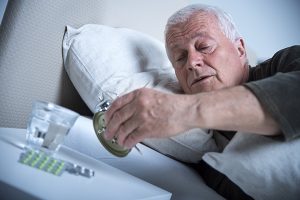
Is there anything better than getting up well rested after a great night’s sleep, completely energized and ready to face your day? For most older adults – as much as a third of them – getting enough sleep only occurs inside their dreams. And sadly, it is a common assumption that inadequate sleep is just something to be accepted within our later years – a misconception that Preeti Malani, M.D., chief health officer and professor of medicine at the University of Michigan really wants to dispel.
As stated by Dr. Malani, “If older adults believe that these changes are a normal, inevitable part of aging, they may not think of it as something to discuss with their doctor. And not discussing it can potentially lead to health issues not being identified and managed.”
Rather than simply tossing and turning, just about 40% of older adults with sleep issues are depending on sleeping drugs – something that is frequently risky as we grow older. Sleeping drugs double the risk of falls and fractures in seniors, due to the increased dizziness and disorientation they could cause. Older adults may also be susceptible to becoming reliant upon these kind of medications. And, the risk for automobile accidents can be increased, according to Consumer Reports’ Choosing Wisely campaign.
And the concern about sleeping medications also includes herbal solutions and supplements as well, which place older adults at an increased risk for many different additional side effects. Even something as outwardly innocuous as melatonin can interact with other common prescriptions, such as those for diabetes and high blood pressure, and also cause dizziness and nausea.
Step one in addressing sleep concerns for seniors would be to work together with the physician to rule out any underlying conditions (such as depression, anxiety, restless legs syndrome, or even cardiovascular disease, to name a few) and also to receive his / her recommendations on just how to safely improve sleep. Several safer alternatives include:
Midnight Sun Home Care, the top rated company to turn to when looking for a personal care assistant in Alaska, can help in a variety of ways as well. Our fully trained and experienced in-home caregivers can certainly help seniors stay active during the day with exercise programs, fun outings, and more, setting the stage for night’s sleep. Contact us online or at (907) 677-7890 for more information.